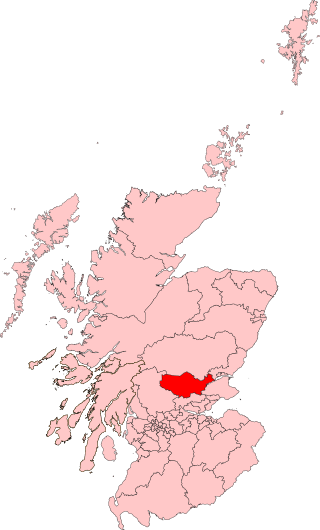Banffshire was a constituency of the House of Commons of Great Britain from 1708 to 1800, and of the House of Commons of the Parliament of the United Kingdom from 1801 to 1983. It elected one Member of Parliament (MP), using the first-past-the-post voting system.
Elgin Burghs was a district of burghs constituency of the House of Commons of Great Britain from 1708 to 1801 and of the House of Commons of the United Kingdom from 1801 to 1918. Until 1832, when Peterhead was added, the constituency comprised the parliamentary burghs of Elgin, Cullen, Banff, Inverurie and Kintore, lying in Elginshire, Banffshire and Aberdeenshire.
Argyllshire was a county constituency of the House of Commons of the Parliament of Great Britain from 1708 to 1800 and of the House of Commons of the Parliament of the United Kingdom from 1801 until 1983. The constituency was named Argyll from 1950. The constituency was replaced in 1983 with Argyll and Bute.
Sutherland was a Scottish constituency of the House of Commons of the Parliament of Great Britain from 1708 to 1801 and of the Parliament of the United Kingdom from 1801 to 1918.
Edinburghshire was a Scottish county constituency of the House of Commons of the Parliament of Great Britain from 1708 to 1801 and of the Parliament of the United Kingdom from 1801 to 1918.
Ross and Cromarty was a county constituency of the House of Commons of the UK Parliament from 1832 to 1983. It elected one Member of Parliament (MP) using the first-past-the-post voting system.
Montrose Burghs was a district of burghs constituency represented in the House of Commons of the Parliament of the United Kingdom from 1832 until 1950.
Forfarshire was a Scottish county constituency represented in the House of Commons of Great Britain from 1708 until 1800, and then in the House of Commons of the United Kingdom until 1950.
Hawick Burghs was a district of burghs constituency of the House of Commons of the Parliament of the United Kingdom from 1868 until 1918. It consisted of the Roxburghshire burgh of Hawick and the Selkirkshire burghs of Galashiels and Selkirk.
Kilmarnock Burghs was a district of burghs constituency of the House of Commons of the Parliament of the United Kingdom from 1832 to 1918. It elected one Member of Parliament (MP) by the first-past-the-post voting system.
Dunbartonshire was a county constituency of the House of Commons of Great Britain from 1708 to 1801 and of the House of Commons of the Parliament of the United Kingdom from 1801 to 1950.

Perth was a constituency of the House of Commons of the Parliament of the United Kingdom from 1832 to 1918, 1918 to 1950, and 1997 to 2005. From 1832 to 1918 it was a burgh constituency. From 1918 to 1950, and 1997 to 2005, it was a county constituency. During each of the three periods it elected one Member of Parliament (MP).
Caithness was a county constituency of the House of Commons of the Parliament of Great Britain from 1708 to 1801 and of the Parliament of the United Kingdom from 1801 to 1918.
Elginshire and Nairnshire was a county constituency in Scotland. From 1832 to 1918, it returned one Member of Parliament (MP) to the House of Commons of the Parliament of the United Kingdom, elected by the first-past-the-post voting system.
Stirling Burghs was a district of burghs constituency of the House of Commons of the Parliament of the United Kingdom from 1708 to 1918.
Falkirk Burghs was a district of burghs constituency of the House of Commons of the Parliament of the United Kingdom from 1832 to 1918. The constituency comprised the burghs of Falkirk, Airdrie, Hamilton, Lanark and Linlithgow, lying in Stirlingshire, Lanarkshire and Linlithgowshire.
St Andrews Burghs was a district of burghs constituency, representing various burghs of Fife, Scotland, in the House of Commons of the Parliament of the United Kingdom, from 1832 to 1918.
Kincardineshire was a constituency of the House of Commons of the Parliament of Great Britain from 1708 to 1801 and of the Parliament of the United Kingdom from 1801 to 1918. It was represented by one Member of Parliament (MP).
Ayr Burghs was a district of burghs constituency of the House of Commons of the Parliament of Great Britain from 1708 to 1800 and of the House of Commons of the Parliament of the United Kingdom from 1801 to 1950. It elected one Member of Parliament (MP), using the first-past-the-post voting system.
Kirkcaldy Burghs was a burgh constituency of the House of Commons of the Parliament of the United Kingdom (Westminster) from 1832 to 1974. It elected one Member of Parliament (MP) by the first-past-the-post voting system. From 1832 to 1950 it was, officially, a district of burghs constituency.
This page is based on this
Wikipedia article Text is available under the
CC BY-SA 4.0 license; additional terms may apply.
Images, videos and audio are available under their respective licenses.

